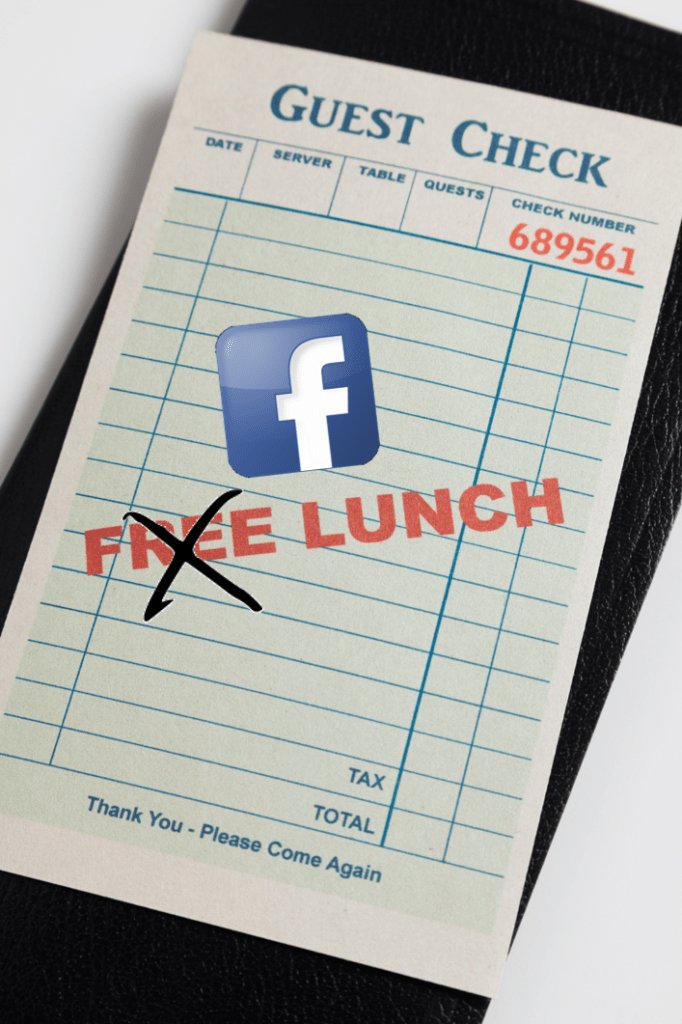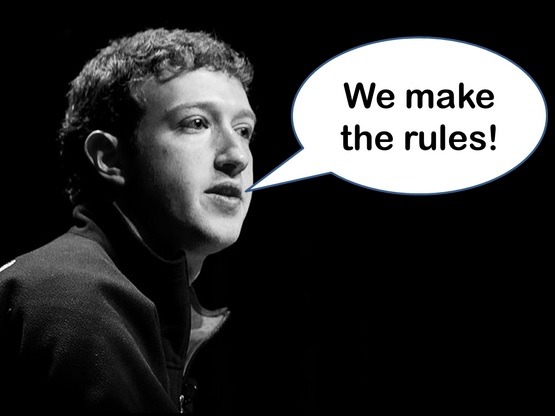
Mark Zuckerberg has never been shy about changing his own rules. From Facebook’s beginnings, his team has continually tweaked the model, often launching changes, updates, and modifications – almost always without a heads-up or warning.
But of course, that’s his prerogative. He’s the landlord, the boss man, the kahuna. And he can do whatever he pleases to ensure his mega-social machine stays on top, fending off the competition, or in the case of Instagram and WhatsApp, going out and buying them.
But sometimes, businesses – including radio companies – forget the obvious. Facebook is fun, it’s interactive, and oh, by the way – it works. It drives traffic, it sells products, and it turns people onto news stories, memes, photos, and other content.

So, for publishers on Facebook, there are two key rules:
- Facebook makes the rules
- If you don’t like a new Facebook policy, refer to rule #1
As is their right, Facebook did an about-face last week, refocusing its massive platform on what they now call “meaningful interaction.”
Translation: That means the effectiveness of “your” brand’s Facebook page is going to change…soon. Of course, even the experts are guessing about how the newly revamped algorithm will punish companies that have enjoyed a free pass on Facebook. But it’s going to happen, and it means all that posting your station does will not have the reach and impact it once did. There have been vague directives in the past, but this new initiative provides more philosophical clarity.
Some will cry “Unfair!”
After all, consider how much “free advertising” the radio industry (and everyone else) has provided Facebook over the last decade or so. That has to be worth something, right?
In truth, Facebook has provided great value for many radio and personality brands, especially in an era when many station marketing budgets have been no more robust than the coffee fund.
But the value of Facebook to brands is definitely going to diminish.
So what’s driving this change of heart? It’s hard to know precisely what is changing Mark Zuckerberg’s state of mind, but we can speculate. It could be all the “fake news” posts that were purchased during the last election, along with revelations that even Facebook doesn’t know the full extent its platform has been compromised by bad actors in recent years. From hate speech to foreign disruption, Facebook – and by extension, Zuckerberg – has had a tough year.
And that means going back to the basics. A recent story in The New York Times by Mike Isaac frames up Zuckerberg’s new thinking – a return to the original purpose of the social network:
“We want to make sure that our products are not just fun, but are good for people.”
So, all the different ways your station has been using Facebook to drive traffic back to your website, your air, your podcasts, and your videos are going to be trumped by photos and posts about cats, kids, gossip, anniversaries, and back-to-the-basics interaction with friends and family.
In the same article, Zuckerberg suggests the last several months have been times of reflection for the Facebook inner circle. And while this throwback policy will cause Facebook some financial angst. Bloomberg estimates a lowered stock price has cost him north of $3 billion, but alas, he can afford to take a hit.
In his mind, the greater good is to…do good. Here it is, directly from Zuckerberg:
“What are we really here to do? If what we’re here to do is help people build relationships, then we need to adjust.”
And by extension, so will all of us. Our digital team members, our talent, our sales staff, and our marketers are going to have to return to their own basics. That’s because the Facebook free lunch is over.
Nearly four years ago when Lori Lewis was our Director of Social Media, this blog addressed this same topic. Lori wrote the insightful post linked below, suggesting brands not depend on Facebook policies in order to survive and thrive. I’ve linked it below so you can see we were espousing this same message back in the Obama era. It’s a good read, and still relevant as Facebook recasts itself yet again:
And it’s not just Facebook. An over-reliance on any platform where radio is paying little to nothing for exposure and promotion can be a slippery slope. As we’ve learned in recent years, Apple can – and does – change its app policies, Amazon continues to rejigger its Alexa rules, Google will inevitably do the same with its smart speaker line, and YouTube can institute new policies whenever it likes.
And so that means not losing focus on your most important assets – the ones you own, not the ones like Facebook that you “rent.”
Your website, your podcasts, your talent (assuming they’re under contract), your brand, your license – these are all things you’re stewarding on behalf of your company. You control most if not all of these (OK, there is the FCC), and while some of these other so-called assets may get changed as arbitrarily as homeowners association rules, your true equity is most deserving of research, development, and further investment.
The Facebook rules change is a reminder that broadcasters need to take stock of their proprietary content and distribution outlets, rather than letting Mark Zuckerberg, Tim Cook, and Jeff Bezos control your digital destiny.
In a recent AllAccess story, Lori offers good advice about how brands might still be able to derive benefit from their Facebook pages. It will apparently come down to stimulating conversation rather than promoting your ticket giveaways and sales remotes. But even she doesn’t know precisely how all this will play out. Just like with the IRS, Nielsen, and
And that’s why, a re-emphasis on your own house, your proprietary assets, your direct line of communication to your audience (and your advertisers) may, in fact, be the lesson that emerges from this.
The Facebook free lunch is over.
Check please.
- Radio Listeners Don’t Get Tired Of Music, Only PDs And Music Directors Do - December 26, 2024
- It’s The Most Wonderful Time Of The Year - December 25, 2024
- Is Public Radio A Victim Of Its Own Org Chart – Part 2 - December 24, 2024




The Facebook free lunch was over a few years ago. Despite all the histrionics, nobody knows how, or if this is actually going to play out . This announcement doesn’t sound much different then announcements a few years ago. Last week, at my shop, which is not a radio station, we had a post that reached over 2 million because the topic touched the emotions of people who were interested. If you are posting spare me stuff, the algorithm is going to punish you and frankly, good riddance. Keep your content game up, and though nobody can guarantee anything, you at least have a much better chance. Yes, pay to play is a factor.
Brad, good points all. It keeps coming down to great content that connects with people – not your Eagles ticket giveaway at 11 am. Thanks for the comment.
It was never a ‘free lunch.’ Well, actually it was a free lunch for Facebook, they were using all of your assets to send your listeners to Facebook. I wonder how many times your airwaves said ‘Facebook’ in a typical hour? Promoting a direct advertising competitor with your valuable airwaves. When asked why you we’re doing this, the typical answer was, “What else are we going to do, we don’t have any other choice. It’s just the way it is.” Check please!
John, exactly. “Because we have to be” is the other response. And while true, there was always a price to be paid. Thanks for the comment.
Yeah it was pretty abrupt shift – sweepers went from directing listeners to our website, to directing them to our Facebook page instead. “Because that’s where our listeners are”.
And in the pre-Word Press website days, it was also clunkier to post on websites, compared to the ease of Facebook. That was yet another reason why jocks and hosts gravitated to social. But the reality of ownership hasn’t changed. Zuckerberg is giving radio a lot to think about. Thanks for commenting.
digital sharecropping. looks good on the surface. but…..then they change the rules.
Time to focus on the tuff stuff….that you control.
Website, SEO, fresh content, email, audio streams, podcasts & rss downloads
Spot on, Mel. Thanks for the comment.
What hasn’t seemed to change much from Lori’s “Obama Era” look at radio’s interactions with Facebook to now is radio brands don’t seem to know what they want from the relationship. As Fred has noted, promoting the next remote or giveaway isn’t doing much for your engagement.
Nor is posting a random meme (even with your logo watermarked). I see them shared all the time by non-radio friends on the newsfeed. A silly meme from a radio station thousands of miles away. How many of those thousands of shares you might crow about are wearing a ppm in your market or filling out a diary?
Radio brands and personalities should look at FB and ask how can I use this platform to convert a user to engage on my platform (website, video, podcast) that is tangible, measurable and monetizable? Then determine what Facebook’s supposed diminished reach is worth to you.
Eric, thanks for making several good points here. I remember Lori and I visited a client who was a little too deep into memes. Yes, they drove “likes,” but little else. And with a little digging, we discovered that many of those likes were coming from out of the market – in fact, out of the country. To your point, not even in the Nielsen ballpark.
All great points… and yes it was always a free lunch for FB… and they get your active database as dessert. To be honest, much of what radio posts, is actually the “end engagement” on the FB feed, and doesn’t lead back into more listening or increased brand time; and that’s not FB’s fault. FB never created anything, every user does that.
Now the FB premium you will pay, will preserve your right to be at the lunch… and you still don’t get to pick the menu… but FB may find better lunch guests for you… MAYBE.
Maybe so. Ultimately, you have to have a solid brand, smart marketing, and a distribution outlet that’s dependable. Facebook is proving once again that when a station places too many chips on social media, things can go wrong. Facebook is asking radio (and other brands) to up its game and connect and converse with fans. Not that much to ask.
Interesting article. While I agree that radio did a ton of free advertising for Facebook, it should also be recognized that Facebook also provided (and still does) a relevant and up-to-date (both in trend & tech) platform that expands the reach of radio, beyond the broadcast area.
Facebook has provided a digital space for the on-air talent to further connect and fortify a relationship with both the artist AND the listener.
Facebook provided an incredibly convenient and appropriate platform for video inclusion. The views garnered on Facebook far surpass when a video is hosted on a station’s website.
Facebook integration, when used correctly, has greatly enhanced the relationship with it’s advertisers and in-turn, increase the almighty bottom line.
When boiled down; this forecasted change will prove what many people (including myself) have been saying for years; that businesses need to create content, specifically for the platform, that is relevant and fosters engagement – AND – that relationship needs to be a 2-way street. The businesses need to be responsive and pro-active when it comes to engaging in posts relevant to them.
The biggest problem on social has been the lack of strategy and creativity. Thinking you can take a TV commercial and put that on your facebook page as video content is certain to get you blocked.
Having a strategy in place is what made Kohl’s a huge winner with the whole Chewbacca Mom scenario. It’s not necessarily having a solid plan start to finish, it’s understanding that conversations internally need to be had when something starts to go viral and understanding who needs to be part of those conversations in order to make the most of it.
Facebook has been nice about it, still giving those pages half a chance to make it into the news feed, but it’s affecting the end-user’s experience, thus it’s gotta go! Very similar to those who used to take a TV spot and put the audio only on radio… it sounded terrible and out of place. Similarly, facebook is not the place for straight-up tv spots.
Terrestrial radio continues to be an excellent means of communication for artists, influencers, businesses and government. It’s still the easiest accessed media out there, freely available to most without subscription or need to submit a username and password.
Talk radio and music stations that take requests & dedications were quite frankly the pioneers, the originators of “Social Media”.
They offer(ed) content that was relevant – specific to the genre the listener was looking for and a way to connect and engage.
For businesses who know how to use social media the correct way, they’ll be just fine. Knowing how to use social media includes understanding what to post, what your fans/followers want to consume, and organically cultivating engagement which can be supplemented with funds from time to time, but only after the post has been up for 48 hours, and a boost that is spread out over a minimum of 72 hours, providing it stays relevant to time and topic.
This comment is brought to you by 1 cup of coffee.
Just one.
About Me: http://www.facebook.com/bigbendecastro
– Award Winning Social Media Influencer & Creator
– 15 Year client of radio
– Fill-in talk-show host on WPRO-AM
– Author of “Because Your Mommy Does CrossFit – Unofficial Parody”
These are truly great points, Ben. Thanks for taking the time (and drinking the coffee). Your comment sums up the mindset radio needs to adopt in order to stay relevant in the social space – especially given that Facebook is changing as I write this. Thanks for taking the time.